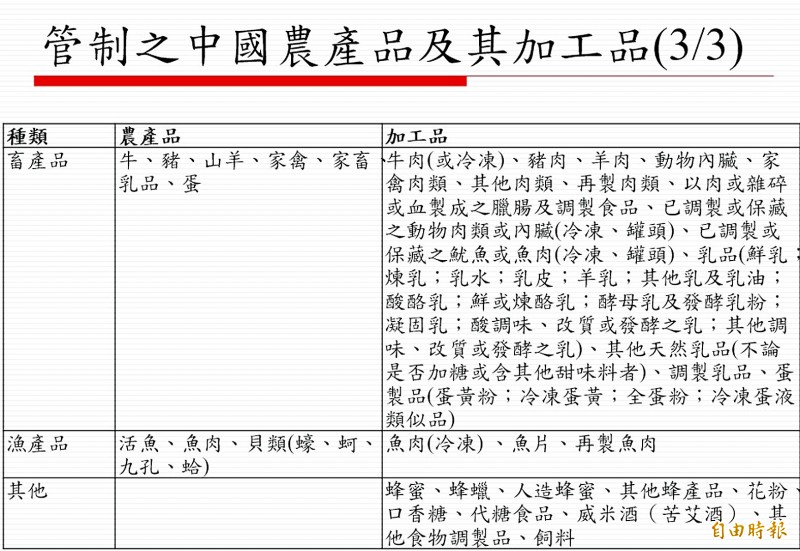《TAIPEI TIMES》 Council defends opposition to free-trade proposal

A list shows Chinese agricultural products that are banned from import, but would be allowed to enter Taiwan under proposed free-trade pilot zone regulations. Photo copied by Chien Hui-ju, Taipei Times
RISK TO AGRICULTURE: The COA said that proposed rules may cause domestic food processors to buy Chinese products, which would affect a strong source of revenue
By Lin Chia-nan / Staff reporter
The Council of Agriculture (COA) yesterday defended its opposition to proposed free-trade pilot zone regulations after Chinese Nationalist Party (KMT) lawmakers accused it of misrepresenting legislation they have proposed.
KMT Legislator Tseng Ming-chung (曾銘宗) and other lawmakers in March proposed a bill to promote free-trade pilot zones modeled on one broached in 2013 by the administration of then-president Ma Ying-jeou (馬英九).
The rules would boost the nation’s economy and competitiveness by relaxing tax and investment regulations, the lawmakers said.
However, the council warned that the rules could affect domestic agriculture.
If the proposal is passed, 830 Chinese agricultural products that are banned from import would be allowed to enter pilot zones for processing, testing or storage, with dealers free of any tariffs, commodity taxes and profit-seeking enterprise income taxes, COA Minister Chen Chi-chung (陳吉仲) said in a Facebook video on Tuesday.
“It would certainly destroy Taiwanese agriculture,” while the “Made in Taiwan” label might be used on products that were made in China, Chen said.
At a news conference in Taipei, the KMT lawmakers accused Chen of spreading misinformation about the proposal and asked him to step down.
“If the government is prepared to join the Comprehensive and Progressive Agreement for Trans-Pacific Partnership, why is it afraid of a free-trade zone?” Tseng asked.
The banned Chinese products are “sensitive” items for Taiwan, and opening the nation to them would impair Taiwanese agriculture, the council said in a statement.
If the proposed rules were promulgated, domestic food processors might purchase Chinese agricultural products that are cheaper, affecting the domestic agricultural processing industry, which generates nearly 37 percent, or NT$201.7 billion (US$6.52 billion), of the wider agricultural industry’s annual revenue, the council said.
The council listed rice, bananas, pineapples and peanuts as sensitive items, while pork, livestock, live clams and abalone are also among banned products, a list compiled by the Bureau of Foreign Trade showed.
Since China reported the its first outbreak of African swine fever in August last year, the government has been striving to keep Chinese pork products out of the nation to prevent the disease spreading to Taiwan, the council said, adding that the importance of its efforts are highlighted by the fact that items intercepted by customs officials often test positive for the disease.
The council would never consent to any bill that would traumatize Taiwanese agriculture and there is no space for compromise, it said.
Additional reporting by Chen Yun
新聞來源:TAIPEI TIMES
%http://www.taipeitimes.com/

















